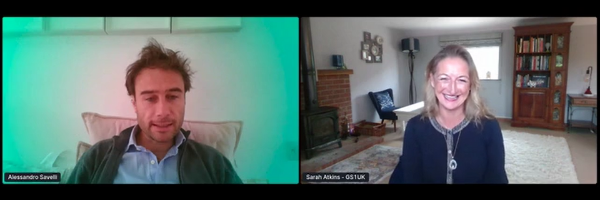July 16, 2021 Opinion piece
Snubbed by Harvard, burned by the impresarios from Dragons’ Den and overlooked by countless investors, Italian-born Alessandro Savelli might have given up on his business vision: bringing premium pasta to the hungry masses.

Instead, he took his dream mainstream, and Pasta Evangelists went from a big idea to a company with a £40m valuation in the space of five years. The business was recently acquired by the world’s largest pasta producer, Barilla.
We recently sat down with Alessandro at Bread and Jam’s D2C summit to talk about his journey from rejection to success and the things that he thinks helped along the way.
Where did the idea for Pasta Evangelists come from?
I saw a big opportunity for creating a premium brand in the fresh pasta space. Essentially, I kind of realised no one was doing it, and the whole pasta category had been dumbed down, was very dusty, and certainly had forgotten what proper fresh pasta and sauces are meant to be like.
They should be a really amazing, fresh, gastronomic experience i.e. something delicious. And instead, the pastas and sauces you get in supermarkets are pasteurised, they're industrial with quite tired brands. And so, I said, “well, what a big opportunity to create the authority in fresh pasta and sauces!”
Why did you decide to sell direct to consumer (D2C)?
I said to myself, just start selling, mate. Start selling. Don't do a plan. Just start selling because that's a good idea.
I started a business because I saw a big opportunity in creating an amazing pasta product. I launched it D2C because that was the fastest way to generate sales.
Having said that, our business is really an omnichannel business. In other words, we sell our pasta on our websites like all these D2C businesses but also in retailers. Actually, a third of our business is with Deliveroo i.e. we work exclusively with Deliveroo and we've got a bunch of dark kitchens scattered around London which cook pasta. So, if you live in London, chances are you can buy our pasta cooked on Deliveroo and deliver to your home within 20 minutes as if you were a restaurant.
But I think the key point is start-ups are risky. And how can you diminish risk? And I really believe that having different channels massively diminishes risk for the entrepreneur and for the enterprise.
You launched Pasta Evangelists alongside a mosaic of founders, how important was this?
Start-ups can be quite lonely, as many people may know, which is fine. We can all do some “lonely”. The problem is that if you’re a sole founder in my view, there's just a lower chance of success. That doesn't mean the more founders you have, the more successful you are. But by my personal opinion, it's better to start a business perhaps on your own but bring people very quickly on as co-founders which is what I did. And in my view, it's a very important process because if you find the right co-founders, it could make or break your business. This is a process and it could take weeks or months, in some cases even years.
I think the other point is what kind of founders you can bring on board as you want people who are in the business full-time with you. The first co-founder Chris, I had met over 25 people multiple times over coffees and lunches to find the right fit. My second co-founder Finn joined a year later.
Equally, I was very happy to get three advisors involved in the business from day one who are CEOs and founders of other similar businesses who provide a couple of hours a quarter and punctual advice, which has been instrumental to the business.
What’s your opinion on giving investors equity?
My philosophy is that I'd rather have a small piece of a big pie. I’ll be generous with equity, but I'll be stringent with investing and with what the person is doing in exchange for the equity i.e. if the person is not doing anything, you take it all back.
And do invest in a decent simple two or three-page contract. I didn't. It probably cost me £200,000 five months ago. So, I would definitely recommend spending £200 on a lawyer to help you slap together a two-page term sheet for some co-founder equity!
What advice would you give to any budding food entrepreneurs out there?
When my previous company failed, I realised that entrepreneurship was a career and contains many facets. I definitely think entrepreneurship is a career, not starting a business and what I’ll be doing for the rest of my life. You don't become managing director of a company on day one. It takes your whole career to become CEO of a company, or a partner at a law firm. And therefore, perhaps in multiple businesses, some may fail, some may be successful. The good news is that you only need to be right once!
Alessandro’s top tips
- Bring on co-founders to increase chances of success and credibility, which makes you attractive for investment
- Use free equity in your company as an exchange to earn promotion from celebrities
- Have your end goal in mind from the beginning and formulate every business decision around that goal
- Remain open minded to take advice from others
- Spend the £200 on a solicitor to create a terms contract sheet to ensure you’re covered and get the right exchange for your investment